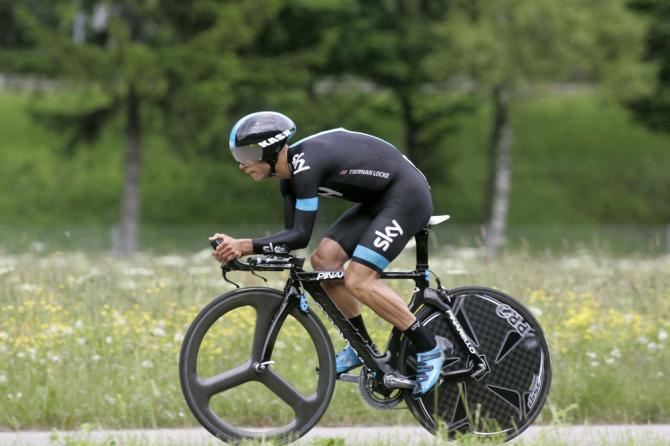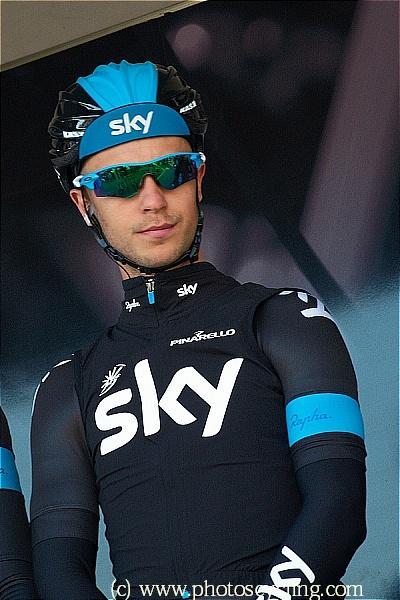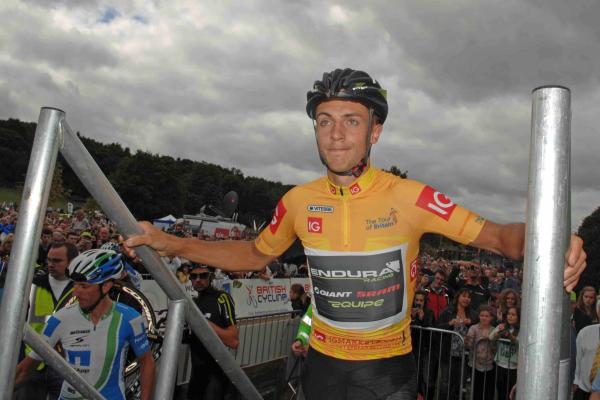Opinion: Why I think Jon Tiernan-Locke is clean
Former teammate on why rider's performances can be believed



I was in a pub around the corner from my house in Bristol with Jon Tiernan-Locke a few years ago, and over drinks we were chatting a little about the upcoming Bristol half marathon. I wondered if it would be sensible to enter without doing any kind of training, and how much damage it would do in the following days.
Tiernan-Locke called to clarify irregular blood values
Former Endura manager defends Tiernan-Locke
Endura Racing insist that Tiernan-Locke was physiologically tested by Sky during passport anomaly
Jonathan Tiernan-Locke granted extension by UCI
Team Sky extends Tiernan-Locke's non-active status
Chris Froome reacts to Tiernan-Locke passport violation
Brailsford on the defence after Tiernan-Locke banned for doping
Then Jon told a story that explained a great deal about him to me.
He said, "Before I started sixth form, I did a Duathlon without any training at all…It was a 5km run 20km bike then a 5km run. I just threw on an old pair of spikes for the run, and smashed the first 5k then hit the bike ride pretty hard."
"I was leading off the bike, but when I got off the bike my feet felt a bit odd and I couldn't get the running spikes back on. So I took my socks off, and a bunch of my toenails fell out of the sock, and I realised my feet weren't doing so well."
"So instead of putting the spikes back on I just ran barefoot to the finish. Trouble was by then my legs cramped up so much I could barely move and I had to walk to the finish. I think I ended up last."
To which I asked, "Why didn't you just quit?"
"Well, I didn't want to pull out… It’s a bit shit not finishing."
The latest race content, interviews, features, reviews and expert buying guides, direct to your inbox!
My girlfriend sat there aghast, but the penny dropped for me. Jon had ‘it’. He had that unbalanced mentality that you find in those rare people who can push themselves beyond anything the rest of us could imagine: he had the mentality of a real athlete. My ears had well and truly pricked up then, because I knew something else about Jon too, that he had ‘it’ physically as well.
The first time I’d seen Jon, I’d been out with my teammates doing a short ride the day before the 2005 Tour of Haut Var. He was racing in the amateur event that we’d stumbled across, and as the break shot past I heard a voice yell out, ‘Southam!’ and saw a young looking guy waving at me from the lead group.
I was impressed to find out later that not only had the British kid who waved at me gone on to win that race, easily beating former World CX Champ Miguel Martinez, he was also just 19 years old and only in his second season racing on the road. Clearly he had physical talent, and a great deal of it to boot.
So when I heard Jon tell that story in a pub a few years later, when he’d finally recovered from the illness that forced him to quit cycling once, and was riding alongside me in the Rapha Condor Sharp team, I knew that he had all the components to be a great cyclist.
Life is made up of all sorts of circumstances and events that fall into place to define who and what we become. What we have innate in us is a certain level of physical talent, and a certain mentality. There are good bike riders with very little talent, but the right mentality, there are good bike riders with great physical ability and limited mental talent, and then there are great bike riders who have both. But none of those can get to where they are going without the circumstances being just right.
The fact is that when I rode with Jon in 2010 and 11 in a UK team it was clear he was a talented but unfocused rider. Nothing really ever added up for Jon, and a lot of the time he didn’t really seem to care. But Jon’s talent was there, and it shone though the cracks in his ‘I don’t give a shit’ veneer. Jon was a rider capable of flashes of absolute brilliance at the strangest of moments. There wasn’t one of us in the team who hadn’t shaken our heads and exclaimed at one time or another that Jon could be so much better.
In September 2011 he finally made something of a breakthrough winning the King of the Mountains and taking 5th overall at the Tour of Britain. But, while 5th place overall in the 2.1 ranked race might not have been a big deal to the World Tour teams that Jon contacted following his ride, it was the piece of the jigsaw puzzle that Jon’s brain had needed to finally switch on, and sure enough in the winter of 2011, Jon started to get lucky.
Jon got lucky that winter because his training bike broke, and his team couldn’t get him another one. For a whole month he was stuck on the home trainer, unable to go out on the road. This was lucky because Jon was an inefficient trainer previously, who did too many hours, and too few intervals. But on a home trainer all he could do was knuckle down, and train in intense bursts of effort, instead of long slow miles.
And then the season started and he got luckier still. It was a freezing cold spring, and Jon, who was notorious amongst teammates for not feeling the cold, and never wrapping up in training, clearly felt no adverse effects from the weather.
He took a big win early, when he caught the sprinters napping and he took a flat stage of the Tour of the Med, and suddenly his confidence went through the roof. It just so happened too, that the following races suited Jon down to the ground.
The stages of races like Haut Var and the Tour of the Mediterranean were also short, which suited a rider who had more intensity than endurance. What was more, both stage races had steep hilltop finishes; the exact type of climb that the Devonian not only grew up cycling on, but had already proved in the previous Tour of Britain that he could excel on.
He won once, he won twice, and then the ball was rolling. As well as the confidence that comes with success, there are practical things too: you can ride at the front, and you get looked after more faithfully by teammates, you get let in the line, and all of this conspires to allow you to make your efforts the ones that count.
To all of us that had known Jon, and had spent weeks sharing rooms, and riding alongside him, it was a natural progression encouraged by a quite remarkable set of circumstances. But of course, eyes rolled and rumours started. At the time I remember thinking that the rumours and innuendo were just unavoidable.
But why was it unavoidable, because his performances were that unbelievable? No, because the cycling public has become cynical and lazy; the doping topic is a sore that people love to scratch, and because it was a lot easier just to assume a hardworking rider had taken shortcuts than look at all the things that had conspired for Jon to become the rider he had.
I sat in the same pub with Jon this April, after he’d put in a number of seemingly anonymous performances at the Ardennes classics. Sitting there wide-eyed, he told me how he just couldn’t believe how hard people fought, and how strong everyone was at that level. It was pro racing but it wasn’t the same racing he’d been able to dominate the year before.
Team Sky was a massive step up and those circumstances that had played in his favour the previous year were conspiring against him now: sickness, weight gains, and having to play the team game all leading to a loss of confidence. My heart sank a little because deep down I knew exactly what people would be saying, and I think he did too.
I don’t write about doping in cycling, really. This may be an unpopular opinion but by and large I don't have much to add to the subject. I do have an advantage when it comes to the subject though as I’ve been a rider, and I’ve been amongst riders who were choosing to dope, and those who weren’t and would never.
When you are in that position you learn very quickly about what another rider’s opinion on the subject is. You listen to the things they say when they’ve had a few too many. You listen to how they talk of others who are caught, and how they feel when these things come out. You listen in the way they gossip and regard other cyclists’ performances.
I have an advantage too, when it comes to Jon Tiernan-Locke, having known him and seen his progression and the way that circumstances have conspired for him, sometimes in his favour and sometimes against him.
So I will tell you this now: I don’t believe for one second that Jon has done anything untoward, not now, not ever. Jon has all of the ingredients to be a great bike rider naturally, I’ve never seen a performance I didn’t believe, and Jon has never once given me the impression that things were different. Not in the years when I was still racing with him, nor at three o’clock in the morning when we’ve been four sheets to the wind in a student bar in Bristol, talking shit, and hanging out as friends.
It is fine not to believe me of course, I could be as full of it as the next man. But think about this: all those circumstances that conspired to make Jon Tiernan Locke into the rider he was last year happened. It might not make a lot of sense until you take a longer look at the full story, but when you do it certainly does.
Whatever circumstances have now conspired to mean that Jon has been called to clarify his irregular blood values, should now also be granted time and space to be looked at thoroughly, and he should have been allowed to do so with the same anonymity that every rider is granted in this instance.
Former professional rider and now Sports Director at Drapac Professional Cycling, Tom Southam writes exclusively for Cyclingnews during this year's
Follow him and his Pro Continental riders as they take on the elite from the WorldTour in Australia.